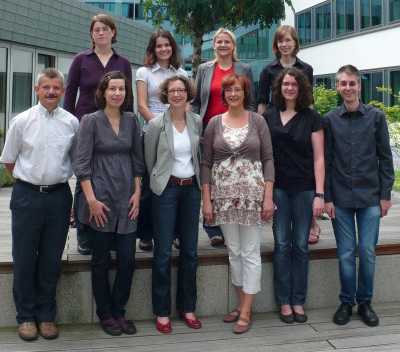The interdisciplinary research group Literary Linguistics is dedicated to the investigation of language phenomena at the interface of literary studies and linguistics. Literary studies and linguistics are natural allies and this apparent truism is already reflected by a considerable body of research. However, most existing scholarship has tended to be selective with regard to the texts investigated, often focusing on individual features of literary texts as illustrated by few, disconnected passages. For example, it has used linguistic tools to describe generic relations within literary texts or to elucidate narratorial intentions.

Our unique approach extends this research by combining three perspectives:
- The aim of this research group is to go beyond isolated investigations of individual features by focusing on and rethinking the communication process at large. Existing studies of the language/literature interface have typically taken a unidirectional communication model as their point of departure.
- Our approach, by contrast, includes a dialogical perspective: we take meaning to be the result of communicative interaction. We hope to show that in this way the interaction between language and literature can be investigated in a more inclusive way.
- These considerations are corroborated by recent findings in the cognitive sciences. Adding a cognitive dimension to the analysis, the studies in this project open up the possibility of a more wide-ranging and general understanding of the interaction between language and literature.
Our methodological basis is reflected by the projects that are pursued in the framework of this research group, whose interdisciplinary diversity reveals the innovative scope of our approach.
Drawing on a methodological framework based on the work of Mikhail Bakhtin, Lena Engel-Mashayekh investigates the polyphonic dimension of contemporary Anglophone novels by authors with a bicultural background to illuminate the cosmopolitan qualities of these texts. Regine Hausser studies dialogicity in contemporary Swedish children’s and youth literature by highlighting linguistic and discursive aspects of multicultural interaction between the majority and the five officially recognized minorities of Sweden (Finns, the inhabitants of the Torne Valley, Sami people, Romani people, Jews). Christian Hofferbert researches the phenomenon of the “marginal man” in selected novels by Graham Greene, enriching a corpus analysis of a selection of Greene’s novels with concepts and categories derived from appraisal theory. Britta London investigates audience expectations and authorial intention in the works of Wladimir Kaminer, seeking to develop a possibly generalisable model of bidirectional interaction between author and audience. Claudia Reitz researches the manifestation of members of the Finnish minority in Swedish and Sweden-Finnish fiction with special focus on the discursive construction and the use of stereotypes. Christoph Unger investigates issues on the borderline between pragmatic inference and procedural as well as conceptual encoding of linguistic meaning, including those that involve the exploitation of metarepresentations giving rise to polyphony or appraisal phenomena.
Academic advisors in charge of this research group are Prof. Anja Müller-Wood, Prof. Anneli Sarhimaa and Dr. Christoph Unger.